
Filter News
Area of Research
- Advanced Manufacturing (5)
- Biology and Environment (40)
- Building Technologies (2)
- Clean Energy (76)
- Computer Science (2)
- Electricity and Smart Grid (1)
- Energy Sciences (1)
- Functional Materials for Energy (1)
- Fusion and Fission (5)
- Fusion Energy (2)
- Isotopes (1)
- Materials (15)
- Materials for Computing (6)
- National Security (15)
- Neutron Science (5)
- Nuclear Science and Technology (1)
- Quantum information Science (1)
- Sensors and Controls (1)
- Supercomputing (16)
News Topics
- (-) Biotechnology (23)
- (-) Security (24)
- (-) Sustainable Energy (129)
- 3-D Printing/Advanced Manufacturing (125)
- Advanced Reactors (34)
- Artificial Intelligence (95)
- Big Data (58)
- Bioenergy (92)
- Biology (100)
- Biomedical (59)
- Buildings (59)
- Chemical Sciences (69)
- Clean Water (30)
- Climate Change (103)
- Composites (29)
- Computer Science (194)
- Coronavirus (46)
- Critical Materials (29)
- Cybersecurity (35)
- Decarbonization (81)
- Education (4)
- Element Discovery (1)
- Emergency (2)
- Energy Storage (111)
- Environment (198)
- Exascale Computing (39)
- Fossil Energy (6)
- Frontier (44)
- Fusion (55)
- Grid (65)
- High-Performance Computing (88)
- Hydropower (11)
- Irradiation (3)
- Isotopes (54)
- ITER (7)
- Machine Learning (48)
- Materials (145)
- Materials Science (144)
- Mathematics (9)
- Mercury (12)
- Microelectronics (4)
- Microscopy (51)
- Molten Salt (8)
- Nanotechnology (60)
- National Security (68)
- Net Zero (14)
- Neutron Science (133)
- Nuclear Energy (110)
- Partnerships (49)
- Physics (63)
- Polymers (33)
- Quantum Computing (35)
- Quantum Science (70)
- Renewable Energy (2)
- Simulation (49)
- Software (1)
- Space Exploration (25)
- Statistics (3)
- Summit (59)
- Transformational Challenge Reactor (7)
- Transportation (97)
Media Contacts
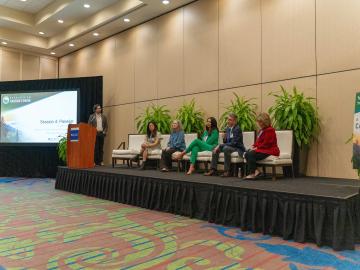
ORNL hosted the second annual Appalachian Carbon Forum in Lexington March 7-8, 2024, where ORNL and University of Kentucky’s Center for Applied Energy Research scientists led discussions with representatives from
The United States could triple its current bioeconomy by producing more than 1 billion tons per year of plant-based biomass for renewable fuels, while meeting projected demands for food, feed, fiber, conventional forest products and exports, according to the DOE’s latest Billion-Ton Report led by ORNL.
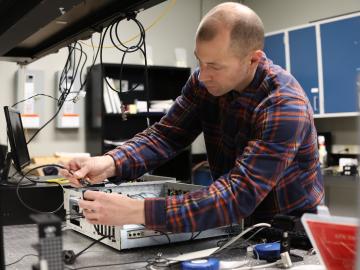
An experiment by researchers at the Department of Energy’s Oak Ridge National Laboratory demonstrated advanced quantum-based cybersecurity can be realized in a deployed fiber link.
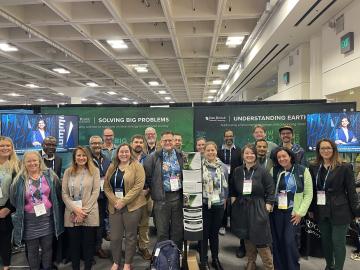
ORNL scientists and researchers attended the annual American Geophysical Union meeting and came away inspired for the year ahead in geospatial, earth and climate science.
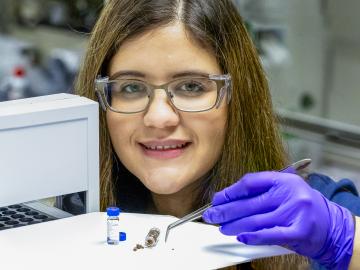
Ilenne Del Valle is merging her expertise in synthetic biology and environmental science to develop new technologies to help scientists better understand and engineer ecosystems for climate resilience.
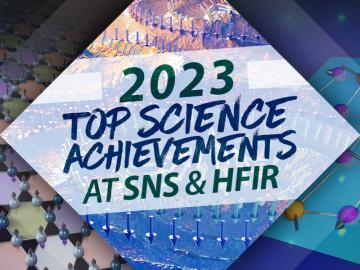
The 2023 top science achievements from HFIR and SNS feature a broad range of materials research published in high impact journals such as Nature and Advanced Materials.
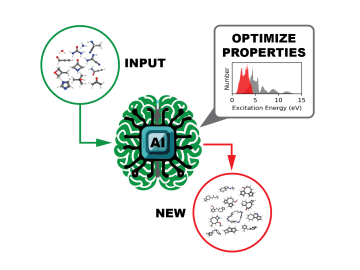
A team of computational scientists at ORNL has generated and released datasets of unprecedented scale that provide the ultraviolet visible spectral properties of over 10 million organic molecules.
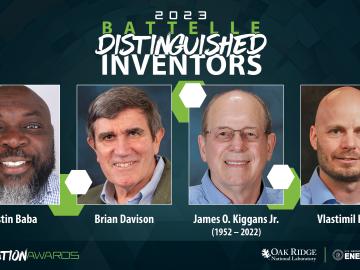
Four scientists affiliated with ORNL were named Battelle Distinguished Inventors during the lab’s annual Innovation Awards on Dec. 1 in recognition of being granted 14 or more United States patents.

Scientists at ORNL used their knowledge of complex ecosystem processes, energy systems, human dynamics, computational science and Earth-scale modeling to inform the nation’s latest National Climate Assessment, which draws attention to vulnerabilities and resilience opportunities in every region of the country.

The Department of Energy’s Oak Ridge National Laboratory announced the establishment of the Center for AI Security Research, or CAISER, to address threats already present as governments and industries around the world adopt artificial intelligence and take advantage of the benefits it promises in data processing, operational efficiencies and decision-making.


